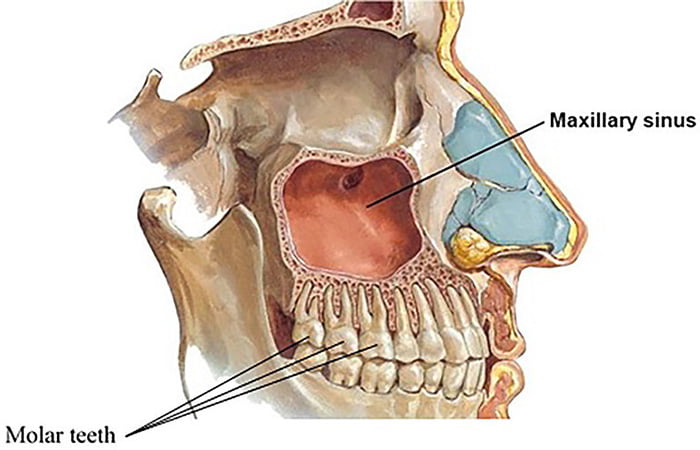It’s estimated that 30 million individuals in the U.S are diagnosed with a sinus infection each year. Many of these people are diagnosed with this infection in early fall and early spring.
Sinus Cavity Pain
Sinus infection is often accompanied by tooth pain. This is not the only thing that causes toothache. Some other things to check include whether you have any decay, tooth sensitivity, or gum disease. To diagnose whether a toothache is sinus or dental, you must know more about sinus tooth pain.

Understanding The Sinus Cavity Anatomy
Sinus cavity is made up of maxillary, ethmoid, sphenoid, and frontal sinuses. The frontal sinuses are located near the forehead, just above the eyes. The sphenoid sinuses are located behind the eyes. The maxillary and ethmoid sinuses are located on each side of the nose. They filter, warm, and moisten the air in the nasal cavity. They also produce mucus which cleans the nose.
Sinusitis is a blockage of the sinuses that leads to a sinus infection. A viral sinus infection will cause congestion and pressure in your sinus cavity. When your upper teeth near your maxillary sinuses get infected, they are very painful.
What’s The Difference Between Tooth Pain and Sinus Pain?
Many people can’t tell the differences between sinus pain and regular tooth pain. Both of these conditions cause similar symptoms, and if your tooth isn’t causing any trouble, you might want to see if the problem is more serious.You have several teeth that hurt and that hurt differently depending on whether you are chewing something hard or something soft.
Tooth pain can have many causes, and it’ll be directed at one tooth. The pain will not get worse with any movements. Toothaches are common in the winter. People often suffer from them because of an infection in the tooth root.
Can a Sinus Infection Cause Tooth Pain?
An infection in any of the sinuses can cause tooth pain. Such will happen because gums, teeth, and sinuses share similar nerves. These nerves are responsible for pain.
Sinuses are filled with a mucous that keeps out harmful germs and toxins. When you have a sinus infection, the sinuses (the passageways through which air enters and leaves the body) become inflammed. Your body is trying to warn you of a dangerous situation. As a result, you may feel pain in your sinuses, gums, and teeth.
Can a Sinus Infection Cause Tooth Pain in Front Teeth?
A sinus infection is likely to cause pain in your back teeth than your front teeth, because the maxillary sinuses are located near the roots of the upper back teeth and not the front teeth. That means when those sinuses become inflamed, they are likely to only make your upper back teeth painful.
Can a Sinus Infection Cause Tooth Pain in Lower Teeth?
You may experience pain in your upper teeth when suffering from a sinus infection. Sometimes this pain can spread to your lower teeth. This is a painful sensation that may be transmitted from one nerve cell to another.
Can a Sinus Infection Cause Jaw Pain?
Sometimes, when we have a sinus infection, our jaw can become quite painful. Such will likely occur if the pressure in your sinus cavity becomes too high due to the infection.
You can also spread the infection to the other areas of your sinus cavity, which can also cause this pain.
Sinus Toothache Symptoms
There are many various symptoms that may be the result of a sinus toothache, including:
- Pain in the upper molars
- Changes in the intensity of the pain when you move
- Headache
- Fever
- Sore throat
- Runny or blocked nose
- Pain behind your cheekbones
- Pain on both sides of your face
- Bad tasting nasal drip
- Inability to taste or smell
Sinus Tooth Pain Relief
If you can’t make it to the doctor or dentist right away, you can try relieving your sinusitis tooth pain with these methods:
- Use a saline solution to rinse your sinuses. Doing this will remove moisture and discharge from your sinuses.
- Eat foods rich in vitamin C, calcium, and Omega 3 fatty acids.
- Drink a lot of water and fluids to thin the mucus in your sinuses.
- When sleeping, switch on a humidifier.
- Take over-the-counter expectorants and decongestants.
- Eat spicy foods.
- When sleeping or resting, keep your head in a tilted position.
- Brush the painful teeth using a gentle brush and a toothpaste that is made for sensitive teeth.

Talk to Your Doctor About Sinus Pains in Teeth
If you are unsure whether a sinus infection or dental problem causes your toothache, see your doctor. They will ask you about the symptoms to determine the cause of the pain. If a sinus infection causes the pain, the doctor will advise you to take over-the-counter medications. These medications will alleviate the pressure in your sinuses and clear any mucus present.
If you take these medications for some time and notice that your symptoms are not reducing, probably another issue is causing the pain. When this is the case, you will need to visit a dentist to determine the issue. The dentist will perform an x-ray to examine your oral cavity and mouth to determine if the pain is due to tooth decay or abscesses.
See Dentist For Life
Are you in search of a reliable and skilled dentist in Marysville, Ohio? Your quest ends here at Dentist For Life! Our practice offers thorough dental care for individuals of all age groups. We accept a diverse range of insurance plans and are open to welcoming new patients. Feel free to contact us at (937) 707-1111 or conveniently book your appointment online.



